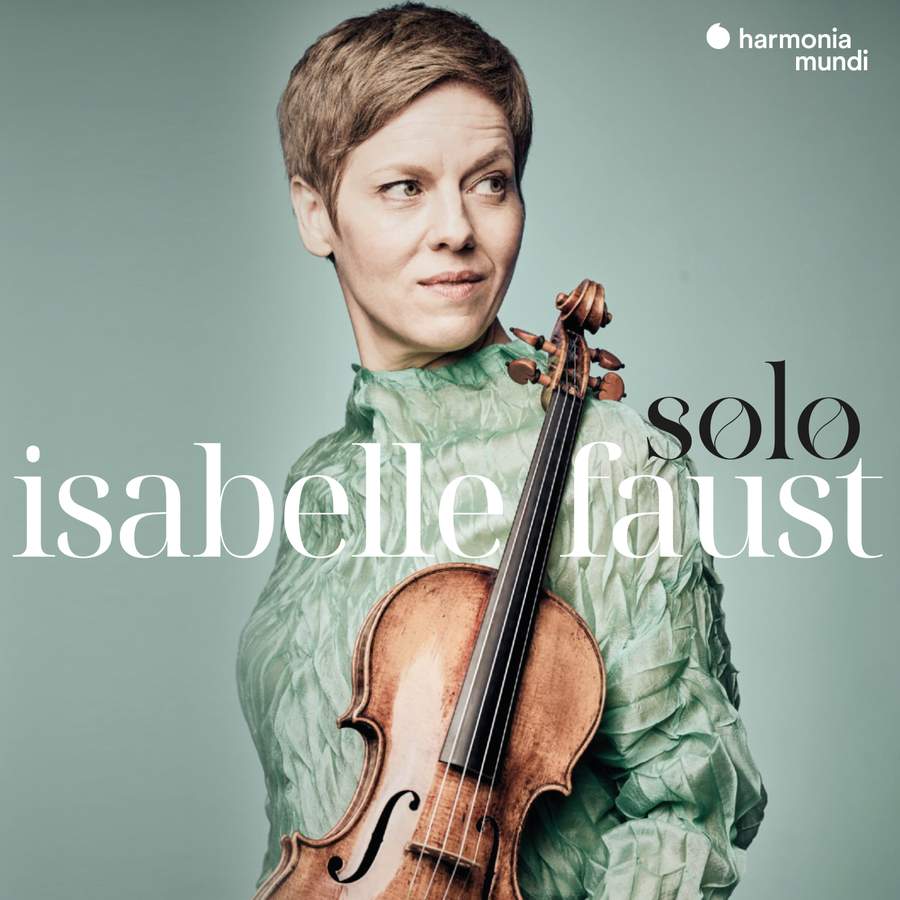Isabelle Faust: Solo
View record and artist detailsRecord and Artist Details
Genre:
Chamber
Label: Harmonia Mundi
Magazine Review Date: 12/2023
Media Format: CD or Download
Media Runtime: 54
Mastering:
DDD
Catalogue Number: HMM90 2678

Tracks:
| Composition | Artist Credit |
|---|---|
| Alia Fantasia |
Matteis the Younger, Composer
Isabelle Faust, Violin |
| Ayres for the Violin, Book 2, Movement: Selection |
Nicola Matteis, Composer
Isabelle Faust, Violin |
| Sonata for Violin and Continuo |
Johann Georg Pisendel, Composer
Isabelle Faust, Violin |
| Amusement for solo violin |
Louis-Gabriel Guillemain, Composer
Isabelle Faust, Violin |
| Artificiosus Concentus pro Camera, Movement: Partita No 5 |
Johann Joseph Vilsmayr, Composer
Isabelle Faust, Violin |
| Passacaglia for Violin |
Heinrich Ignaz Franz von Biber, Composer
Isabelle Faust, Violin |
Author: Mark Seow
Hot on the heels of the shortlisting of Rachel Podger’s ‘Tutta sola’ (Channel Classics, 1/23) in the Instrumental category of the Gramophone Awards, I initially feared that Isabelle Faust had missed the boat. The Baroque repertoire for solo violin is rich, but it is finite. Faust covers two composers already featured on ‘Tutta sola’ (Matteis the younger and Johann Joseph Vilsmayr), and as on Podger’s ‘Guardian Angel’ (11/13), she signs off with Biber’s Passacaglia from the Rosary Sonatas.
Faust begins with the Fantasia by Matteis the younger, also featured by Théotime Langlois de Swarte on his album ‘The Ma Lover’ with lutenist Thomas Dunford (Harmonia Mundi, 12/20). Faust’s interpretation is less colourful than the French 20‑something. But her more varied approach to attack and articulation in this admittedly repetitive musical structure works wonders: there’s a refined punchiness to Faust’s rhetoric. It’s extremely clever, and sees the Matteis not simply drift off into daydream but rather move from phantasmagorical nightmare into white-hot ecstatic trance.
The album’s standout performance is the Giga from Pisendel’s Sonata in A minor. Faust plays with electric clarity. The phrases are expertly shaped in terms of rhythmic structure and harmonic strength – it’s intelligent and eloquent – all the while maintaining a tantalising sense of dance. Ornaments are thrown in with ease and aplomb. The musical parameters at Faust’s disposal – rubato, bow speed, attack, spread of chords and a million other subtleties of bow and left hand – fuse together to make a wholly believable musical utterance. Prose of this kind feels horribly close to vivisection, and so I leave you with this: this Giga lasting 3'47" is worth the entire album alone.
A similarly spectacular moment electrifies the Partita No 5 in G minor by Vilsmayr. The ‘Guiqß’ (sic), a mere 37 seconds, is perfectly provocative. Faust controls the pacing of this simple movement such that by the final cheeky pizzicato this listener is nothing but putty in her hands.
There’s one composer I had not come across before: Louis-Gabriel Guillemain, one of King Louis XV’s highest-paid musicians. Faust constructs a quasi-suite from Guillemain’s Op 18, his last known publication. This feels a tad incongruous, and it is the first and only time I became aware of the limitations in sonority of the solo violin. In all, there’s lots here to enjoy and admire; Faust’s playing is technically superlative, imaginative and fun – if not occasionally over-precise and controlled.
Discover the world's largest classical music catalogue with Presto Music.

Gramophone Digital Club
- Digital Edition
- Digital Archive
- Reviews Database
- Full website access
From £8.75 / month
Subscribe
Gramophone Full Club
- Print Edition
- Digital Edition
- Digital Archive
- Reviews Database
- Full website access
From £11.00 / month
Subscribe
If you are a library, university or other organisation that would be interested in an institutional subscription to Gramophone please click here for further information.




